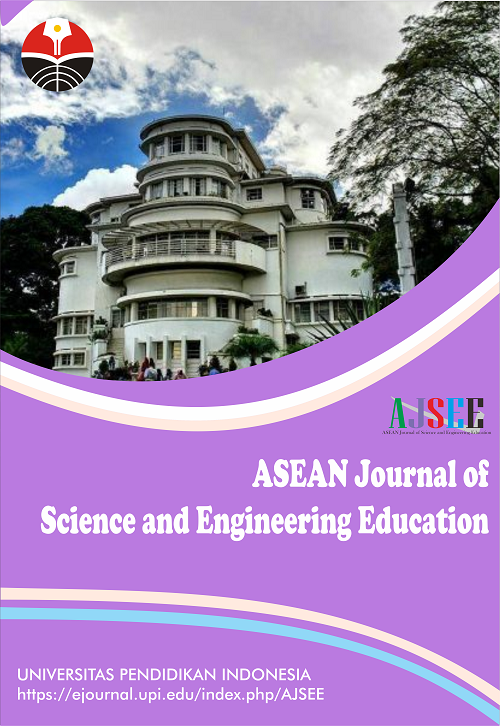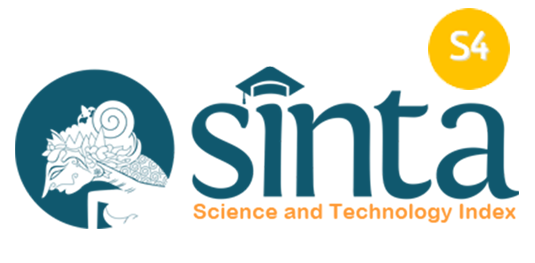Altering Students’ Mindsets and Enhancing Engagement in Mathematics in a Problem-Based Learning
Abstract
Keywords
Full Text:
PDFReferences
Ajai, J. T. and Imoko, I. I. (2015). Gender differences in mathematics achievement and retention scores: A case of problem-based learning method. International Journal of Research in Education and Science, 1(1), 45- 50.
Akinoglu, O. and Tandogan, R.Ö. (2007). The effects of problem-based active learning in science education on students’ academic achievement, attitude and concept learning. Eurasia Journal of Mathematics, Science and Technology Education, 3(1), 71-81.
Aronson, J., Fried, C. B., and Good, C. (2002). Reducing the effects of stereotype threat on African American college students by shaping theories of intelligence. Journal of Applied Developmental Psychology, 38, 113–125.
Awofala, A. O. A, Fatade, A. O. and Ola-Oluwa, S. A. (2012). Achievement in cooperative and individualistic goal-structured junior secondary school mathematics classrooms in Nigeria International Journal of Mathematics Trends and Technology, 3(1), 7-12.
Awofala, A. O. A. (2012). An analysis of the new 9-year basic education mathematics curriculum in Nigeria. Acta Didactica Napocensia, 5(1), 18 - 28
Awofala, A. O. A. (2016). Effect of personalisation of instruction on students’ motivation to learn mathematics word problems in Nigeria. Turkish Journal of Computer and Mathematics Education, 7(3), 486-509.
Awofala, A. O. A. (2017). Effect of personalisation of instruction on students’ anxiety in mathematical word problems in Nigeria, Bulgarian Journal of Science and Education Policy, 11(1), 83-120.
Awofala, A. O. A. (2021). A validation of the mathematical resilience scale for twelfth graders through confirmatory factor analysis and its relationship with achievement in mathematics in Nigeria. SN Social Sciences, 1(8), 1-17.
Awofala, A. O. A. Arigbabu, A. A. and Awofala, A. A. (2013). Effects of framing and team assisted individualised instructional strategies on senior secondary school students’ attitudes toward mathematics. Acta Didactica Napocensia, 6(1), 1 – 22.
Awofala, A. O., Lawal, R. F., Arigbabu, A. A. and Fatade, A. O. (2022): Mathematics productive disposition as a correlate of senior secondary school students’ achievement in mathematics in Nigeria. International Journal of Mathematical Education in Science and Technology, 53(6), 1326-1342.
Awofala, A. O., Lawani, A. O., and Oraegbunam, C. O. (2020). A factor analytic structure of the conceptions of mathematics scale among pre-service mathematics teachers in south-west Nigeria. JRAMathEdu (Journal of Research and Advances in Mathematics Education), 5(1), 94-104.
Biggs, J. B. (1978). Individual and group differences in study processes. British Journal of Education Psychology, 48, 266–279.
Blackwell, L. S., Trzesniewski, K. H., and Dweck, C. S. (2007). Implicit theories of intelligence predict achievement across an adolescent transition: A longitudinal study and an intervention. Child Development, 78, 246–263.
Boaler, J., and Zoido, P. (2016). Why math education in the U.S. doesn’t add up. Science American Mind, 27, 18–19.
Boaler, J., Dieckmann, J. A., Pérez-Núñez, G., Sun, K. L., and Williams, C. (2018). Changing students’ minds and achievement in mathematics: The impact of a free online student course. Frontiers in Education, 3, 1-26.
Bude, L., Imbos, T., Wiel, M., Broers, N., and Berger, M. (2009). The effects of directive tutor guidance in problem-based learning of statistics on students' perceptions and achievement. Higher Education, 57, 23-36.
Claro, S., Paunesku, D., and Dweck, C. S. (2016). Growth mindset tempers the effects of poverty on academic achievement. Proceeding of National Academy Science U.S.A., 113, 8664–8668.
Crawford, K., Gordon, S., Nicholas, J., and Prosser, M. (1998). University mathematics students' conceptions of mathematics. Studies in Higher Education, 23, 87 - 94.
Fatade, A. O., Arigbabu, A. A. Mogari, D., Awofala, A. O. A (2014). Investigating senior secondary school students’ beliefs about further mathematics in a problem-based learning context. Bulgarian Journal of Science and Education Policy, 8(1), 1-42.
Fatade, A. O., Mogari, D., and Arigbabu, A. A. (2013). Effect of problem-based learning on senior Secondary school students’ achievements in further mathematics. Acta Didactica Napocensia, 6(3), 27-43.
Finn, J. D. (1989). Withdrawing from school. Review of Educational Research, 59, 117-142.
Fredricks, J. A., Wang, M. T., Schall Linn, J., Hofkens, T. L., Sung, H. C., Parr, A. K., and Allerton, J. J. (2016). Using qualitative methods to develop a survey measure of math and science engagement. Learning and Instruction, 43, 5-15.
Good, C., Aronson, J., and Inzlicht, M. (2003). Improving adolescents’ standardized test performance: an intervention to reduce the effects of stereotype threat. Journal of Applied Development Psychology, 24, 645–662.
Greene, B. A. (2015). Measuring cognitive engagement with self-report scales: Reflections over 20 years of research. Educational Psychologist, 50, 14-30.
Hmelo-Silver, E. (2004), Problem-based learning: What and how do students learn? Educational Psychology Review, 16(3), 235-266.
Hughes, J. N., Luo, W., Kwok, O., and Loyd, L. K. (2008). Teacher-student support, effortful engagement, and achievement: a three-year longitudinal study. Journal of Educational Psychology, 1, 1-14.
Kaharuddin, A. (2018). Effect of problem-based learning model on mathematical learning outcomes of 6th grade students of elementary school accredited B in Kendari city. International Journal of Trends in Mathematics Education Research, 1(2), 43-46.
Kong, Q. P., Wong, N. Y., and Lam, C. C. (2003). Student engagement in mathematics: development of instrument and validation of construct. Mathematics Education Research Journal, 15,4-21.
Kooken, J., Welsh, M. E., McCoach, D. B., Johnston-Wilder, S., and Lee, C. (2016). Development and validation of the mathematical resilience scale. Measurement and Evaluation in Counseling and Development, 49(3), 217-242.
Maguire, E. A., Gadian, D. G., Johnsrude, I. S., Good, C. D., Ashburner, J., Frackowiak, R. S., et al. (2000). Navigation-related structural change in the hippocampi of taxi drivers. Proceeding of National Academy of Science U.S.A, 97, 4398–4403.
Maltese, A. V., and Tai, R. H. (2010). Eyeballs in the fridge: sources of early interest in science. International Journal of Science Education, 32, 669-685.
Martin, A. J., Way, J., Bobis, J., and Anderson, J. (2015). Exploring the ups and downs of math engagement in the middle school years. Journal of Early Adolescence, 35, 199-244.
Maulidia, F., Johar, R., and Andariah, A. (2019). A case study of students’ creativity in solving mathematical problems through problem-based learning. Infinity Journal of Mathematics Education, 8(1), 1-10.
Mji, A., and Arigbabu, A. A. (2012). Relationship between and among preservice mathematics teachers' conceptions, efficacy beliefs and anxiety. International Journal of Education Science, 4(3), 261 – 270.
Ojaleye, O. and Awofala, A. O. A. (2018). Blended learning and problem-based learning instructional strategies as determinants of senior secondary school students’ achievement in algebra. International Journal of Research in Education and Science, 4(2), 486-501.
Olaoye, O. and Adu, E. O. (2015). Problem-based learning strategies and gender as determinant of grade 9 students’ academic achievement in algebra. International Journal of Educational Sciences, 8(3), 485-492.
Sahin, M (2009). Exploring university students’ expectations and beliefs about physics and physics learning in a problem-based learning context. Eurasia Journal of Mathematics, Science and Technology Education, 5, 321-333.
Savery, J. R. (2006). Overview of problem-based learning: Definitions and distinctions. The Interdisciplinary Journal of Problem-Based Learning, 1(1), 9-20.
Schmidt, H. G., and Moust, J. H. (1995). What makes a tutor effective? A structural-equations modeling approach to learning in problem-based curricula. Academic Medicine, 70(8), 708–714.
Siagian, M. V., Saragih, S., and Sinaga, B. (2019). Development of learning materials oriented on problem-based learning model to improve students’ mathematical problem-solving ability and metacognition ability. International Electronic Journal of Mathematics Education, 14(2), 331-340.
Skinner, E. A. and Belmont, J. J. (1993). Motivation in the classroom: Reciprocal effects of teacher behavior and student engagement across the school year. Journal of Educational Psychology, 85(4), 571-581.
Sungur, S. and Tekkaya, C. (2006). Effects of problem-based learning and traditional instruction on self-regulated learning. The Journal of Educational Research, 99(5), 307-320.
Van Berkel, H. J. M., and Dolmans, D. H. J. M. (2006). The influence of tutoring competencies on problems, group functioning and student achievement in problem-based learning. Medical Education, 40(8), 730–736.
Voelkl, K. E. (1997). Identification with school. American Journal of Education, 105, 204-319.
Wang, M. T., and Degol, J. (2014). Staying engaged: Knowledge and research needs in student engagement. Child Development Perspectives, 8, 137-143.
Wang, M. T., and Holcombe, R. (2010). Adolescents' perceptions of school environment, engagement, and academic achievement in middle school. American Educational Research Journal, 47, 633-642.
Wang, M-T., Fredricks, J. A., Ye, F., Hofkens, T. L., and Linn, J. S. (2016). The Math and Science Engagement Scales: Scale development, validation, and psychometric properties. Learning and Instruction, 43, 16-26.
Wheijen, C. (2005). Impact of constructivist teaching on student beliefs about teaching and learning in introductory physics. Canadian Journal of Science, Mathematics and Technology Education, 5(1), 95-109.
Zimmerman, B. J. (1990). Self-regulated learning and academic achievement: An overview. Educational Psychologist, 21, 3-17.
DOI: https://doi.org/10.17509/ajsee.v4i2.67956
Refbacks
- There are currently no refbacks.
Copyright (c) 2024 Universitas Pendidikan Indonesia

This work is licensed under a Creative Commons Attribution-ShareAlike 4.0 International License.














